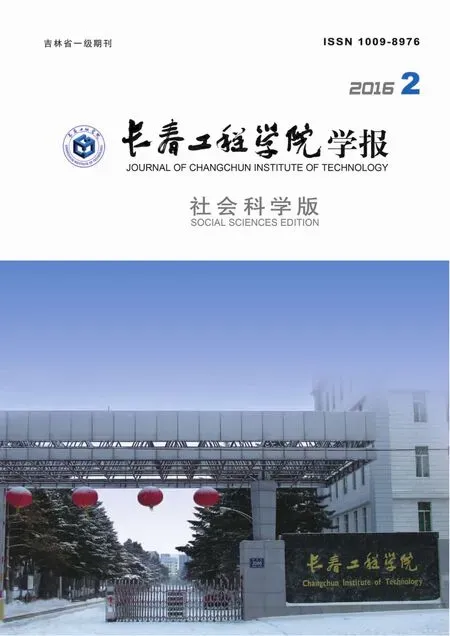英文化工专利文献中长句翻译的功能对等
石 蕊
(天津外国语大学 英语学院,天津 300204)
英文化工专利文献中长句翻译的功能对等
石蕊
(天津外国语大学 英语学院,天津 300204)
化工专利文献属于信息型文本,其翻译应以实现信息传递准确和译语读者接受为准则。英文化工专利文献以结构复杂和层次繁多的长句为特征。本文通过分析英文化工专利文献中7种长句翻译法,探讨如何实现该文本类型翻译中信息功能与交际功能的对等。
化工专利文献;信息型文本;长句;信息功能;交际功能
功能翻译论认为“对源语文化是‘再现’(reproduction)还是‘改写’(adaptation),应根据翻译目的、翻译要求和文本功能类型而定”[1]。强调文本功能对翻译的影响,为不同实用文体中具有不同功能的文本而采取相应翻译策略提供了理论可行性和实践操作性。
化工专利文献属于“信息型”文本,具有客观地传递科技信息、促进科技交流等功能。本文通过分析英文化工专利文献中的长句翻译,探讨该文本类型翻译如何实现原、译文的信息功能与交际功能对等。
一、化工专利文献的“信息型”文本功能
专利文献主要是指专利说明书,是发明人或申请人向有关国家政府主管专利的机构申请提交的,包含有法律效力和技术性的说明文件[2]。“‘信息型’文本的主要功能在于向读者提供真实世界的客观事物和现象。语言和文本形式的选择应服从于这一功能。”[3]化工专利文献翻译须考虑“信息型”文本功能,才能实现译文在信息传递、语言表达、文体风格、读者反应等层面的功能对等。
二、化工专利文献中长句翻译的功能对等
化工专利文献“讲究术语表达的专业性,语言表述的直陈性、客观性、逻辑性,文体风格的不变性等”[4],客观详细介绍化工发明专利描述。翻译中,信息传递的真实性及受众理解是核心,要以“传神达意,重原语理解,重译入语正确”为准则,实现原、译文本的功能对等。
(一)“忠实达意”实现信息功能对等
奈达“功能对等”原则,强调用“最切近的自然对等语再现源发语的信息”[5],主张信息功能高于一切。
例:Into a 320 ml.stainless steel reaction vessel are charged 11.6 g.of cesium fluoride and 20 ml.of diethylene glycol dimethyl ether.The vessel is cooled to -80 ℃ and evacuated.There are then added 60 g.of perfluoro-isobutyryl fluoride and 43 g.of hexafluoropropylene epoxide.The bomb is heated to 100 ℃ for 4 hours.[6]
将11.6 g的氟化铯和20 ml.二甘醇二甲醚放入320 ml.不锈钢反应容器。容器冷却至-80 ℃后排空。然后添加60 g.全氟异丁酰基氟化物和43 g.六氟丙烯环氧化物。再将反应容器加热4小时至100 ℃。
同一专利中常现“一词多义”现象。翻译理解务必准确,结合专业知识及上下文语境,切勿一概而论。
(二)“通顺传神”实现交际功能对等
“单纯强调传递原文所谓的‘真实信息’而忽视读者效应,导致译文生硬牵强,影响甚至破坏信息传递的效果。”[7]不同语言的化工专利文献在句型结构存在明显差异。英语重“形合”,汉语重“意合”。处理化工英文长句时,讲求由英语“树状形”转换为汉语“波浪形”句子结构,“神”重于“形”,从而实现译语环境中的交际功能。
1.顺译法Linear
化工专利文献中描述连续的反应过程时,运用顺译法保证译文再现原反应的整体性和“流线型”。
例:(1)A glass tubular reactor 1.75 inches in diameter,12 inches in length,(2)having a coarse fritted glass disc at one end (3)and containing suitable thermocouples to permit uniform heating over its entire length by means of a tubular furnace (4)is filled to about one half its volume with 200—325 mesh glass “Microbeads.”[6]
(1)玻璃管式反应器直径1.75英寸,12英寸长,(2)一端为粗糙的玻璃平衡盘,(3)且具有合适热电偶以促成通过管式炉使反应器整体均匀加热,(4)用200—325目玻璃“微珠”将反应器约一半容量填满。
2.切分法Cutting
化工专利文献中常用长句描述反应方法的全部细节,翻译时宜将英语长句按意群切分为若干小句,译文流畅且信息点一一准确对应。
例:(1)A hypochlorite(s) is preferably used as the oxygen-containing oxidizing agent,//(2)and has an advantage that hypochlorous acid ions are produced under the reaction conditions //(3)and are converted into chlorine ions by reacting with HFP to form a salt having no oxidizing effect.[8]
(1)次氯酸盐宜用作含氧氧化剂,//(2)促使反应条件下生成次氯酸离子,//(3)次氯酸离子与HFP反应转化成氯离子从而形成无氧化盐。
3.倒置法Reversing
也叫逆序法,指颠倒英语长句的语序,将句子成分的前部分放到译文的后部,或将后面部分放到译文前面,以使译文符合汉语的习惯表达。
例:(1)Reaction times may be controlled quite effectively //(2)when using a bed type reactor by means of suitable gas flow-measuring devices for the input gaseous reactant and the carrier or dilution gas.[6]
(2)使用床式反应器,通过适合的气体流量测量设备输入气体反应物,载气或稀释气体,//(1)可有效控制反应时间。
4.内嵌法Embedding
亦称包孕法,主要用于翻译英语的定语结构(包括用做定语的短语、分词及从句等),转换为汉语“……的……”前置定语,适于专利中概念名称、过程等处理。
例:Many organic liquidswhicharesubstantiallyhalogenatedandaregoodsolventsforbothHFPandHFPOare not preferred in the present invention.[9]
许多充分卤代并作为HFP和HFPO良溶剂的有机液体在本发明中不作为首选溶剂。
5.拆分法Splitting
将原文中的某部分(如单词、短语或从句)提取出来单独处理,或放在译文句首或句末,既忠实原文信息,又符合译语表达。
例:In the case in which the third phase consists only of HFP and HFPO,the reactant and product can be recovered from the reaction mixturesimplyby reducing the pressure and allowing the third phase to evaporate to a gas.[10]
简而言之,在只包含HFP与HFPO存在的第三相中,通过降压至气态,反应物与产物可从反应混合物中还原。
英语长句中定语部分过于冗长,宜单独提出,而不再内嵌于原句中,保持译文顺畅。
例:The fluorinated acid fluorideswhicharereactedwiththehexafluoropropyleneepoxidetoformtheperfluoro-2-alkoxypropionylfluoridein the process of the present invention may vary widely in their structure.[8]
本发明过程中,氟酸氟化物与HFPO反应形成全氟—2—烷基丙酰氟,氟酸氟化物的结构存在较大差异。
6.插入法Inserting
化工反应过程经常出现温度、压力等反应条件变化要求,可考虑插入原文中没有的标点符号(破折号、括号、冒号等),以分清层次,保持原文的连贯性。
例:The reaction is carried out within the temperature range 100 to 450 ℃,and preferably within the range 275 to 400 ℃.More particularly,the temperatures utilized are preferably 375 to 400 ℃,when employing an oxide of a Group IV-A element,and 275 to 325 ℃,when employing any of the other aforesaid oxides to achieve the optimum in yield and conversion to vinyl ether and a minimum in unwanted by-products.[11]
反应在100—450 ℃温度范围内进行(适宜范围275—400 ℃)。特别注意,使用团IV-A元素氧化物时,温度为375—400 ℃;275—325 ℃时,使用上述其他氧化物以达到最优产量,并转换为乙烯基醚,同时析出最少副产物。
7.重组法Recasting
也叫综合法,描述化工反应过程的复杂长句涉及多步骤、多种工艺流程,及多种化学物质,保持原译文信息对等基础上,需大幅度打破原文句式结构,形成全新译文表达。
例:A method of purifying hexafluoropropylene oxide //which comprises separating hexafluoropropylene oxide from hexafluoropropylene //by an extractive distillation //in the presence of a normally liquid compound //selected from the group//consisting of chlorinated hydrocarbons //having 2 or more carbon atoms //and dialkyl ethers //wherein at least one alkyl group is branched //and has 3 or more carbon atoms,//and recovering purified hexafluoropropylene oxide as the distillate.[12]
提纯HFPO的方法是:从含2个或多个碳原子的氯化烃,与含1个烷基分支、3个或多个碳原子的二烷基醚中提取常规液体混合物,利用液体通过萃取蒸馏方式将HFPO从HFP中分离,再将提纯的HFPO还原作为馏出物。
三、结语
实践证明,应用翻译须从文本功能出发,结合翻译目的,找到适宜翻译策略。在处理化工专利文献等“信息型”文本时,应以实现原文信息传递和译语读者接受为准则,从而达到文本信息功能和交际功能对等,才能更好的满足整体效应。
[1]贾文波.功能翻译理论对应用翻译的启示[J].上海翻译,2007(2):10.
[2]任楚威.英文专利文献的语言特点及其翻译研究[J].中国科技翻译,1994(1):25.
[3]Newmark Peter.Approaches To Translation[M].上海:上海外语教育出版社,2001:39.
[4]原传道.英语“信息型文本”翻译策略[J].中国科技翻译,2005(3):50.
[5]Nida Eugene A.Language and Culture,Contexts in Translation[M].上海:上海外语教育出版社,2001:91.
[6]Charles Gerhard Fritz and Stanley Selman.Fluorinated Vinyl Ethers and Their Preparation:US,3291843[P].1966-12-13.
[7]贾文波.应用翻译功能论[M].北京:中国对外翻译出版公司,2004:195.
[8]Hideki Nakaya,Michio Asano,and Hideya Saitou.Process for Production of Hexafluropropylene Oxide:US,12/447,130[P].2007-10-23.
[9]Lawson,James Robert.Two-liquid-phase Epoxidation of Hexafluoropropylene at Low PH:EP,91307838.2[P].1991-08-28.
[10]Lawson,James Robert.Three-liquid-phase Epoxidation of Perfluoroolefins:EP,90309337.5[P].1990-08-24.
[11]Carl Edward Lorenz.Fluorocarbon Ethers:US,3321532.[P].1967-05-23.
[12]Yoshio Oda,Keiichi Uchida and Shinsuke Morikawa.Method of Purifying Hexafluoropropylene Oxide:US,4134796[P].1979-01-16.
Text function in long sentence translating in chemical patent specification
SHI Rui
(SchoolofEnglishStudies,TianjinForeignStudiesUniversity,Tianjin300204,China)
Chemical patent specification,defined as the informative text and featured as long sentences with complex structures,should focus on truth and readership in its translation.This paper,examining 7 strategies for translating long sentences,explores the realization of informative and communicative functional equivalence in chemical patent specification.
chemical patent specification;informative text;long sentences;informative function;communicative function
10.3969/j.issn.1009-8976.2016.02.017
2016-02-20
天津外国语大学科研规划项目“功能翻译理论对应用翻译的策略主导”(项目编号:11YB06)
石蕊(1979—),女(回族),天津,硕士,副教授
H315.9
A
1009-8976(2016)02-0059-03
主要研究翻译理论与实践,应用翻译。

